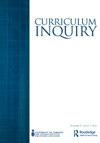What teachers know, what teachers do
IF 1.6
3区 教育学
Q2 EDUCATION & EDUCATIONAL RESEARCH
引用次数: 1
Abstract
it would be difficult for us, as authors, to tell you, as readers, how we go about writing this editorial. We could describe a few steps we take, like brainstorming, reading and re-reading the articles, formulating a throughline and finding connections, and creating an outline. But how precisely we go about writing sentences, creating paragraphs, and weaving ideas together is not something we can quite explain, even though we do it all the time. While we do this thing called writing, how different knowledges and experiences inform or shape the way we write is hard to describe. the same is true of teaching. the practices of teachers in classrooms are perhaps more complex than writing an editorial—and the consequences are of course much more significant! How teachers teach has a direct impact on the kinds of experiences students have, what and how they learn—or do not learn—and to some extent, who students become. While some aspects of what teachers do can be described, codified, explained, and made explicit, much of what happens in classrooms is implicit, subtle, based on instincts, and moved by assumptions that are hard to pinpoint or identify, much less explain. often, experienced teachers do what they do simply because they know—or think they know—that it works, without necessarily being able to explain why it works. this is what some curriculum scholars have framed as teachers’ “practical knowledge,” the things teachers know that implicitly shape what they do in practice (Clandinin, 1985; Elbaz, 1981). Since its development as a way to understand what teachers know and how it informs what they do, the concept of teachers’ practical knowledge has had a significant influence on curriculum studies and teacher development in particular. as a powerful way to understand teacher practice “as being driven by an intuitive, often inexpressible, and fundamentally situated know-how,” practical knowledge “captures the contingent and situated nature of the day-to-day lived experiences of many teachers” (aspbury-Miyanishi, this issue, p. 480). Yet, as Edmund aspbury-Miyanishi points out in the first article in this issue, titled “the Skilled teacher: a Heideggerian approach to teacher Practical Knowledge,” the concept of practical knowledge does not sufficiently account for the contextual circumstances that lead teachers to take some action instead of another. in other words, relying on practical knowledge assumes that teachers take actions based only on what they know and does not account for the external conditions that shape whether and how teachers make decisions about which knowledge is relevant for action under which circumstances.老师知道什么,老师做什么
作为作者,我们很难告诉你,作为读者,我们是如何写这篇社论的。我们可以描述我们采取的几个步骤,比如头脑风暴、阅读和重读文章、制定思路和寻找联系,以及创建大纲。但是,我们如何准确地将句子、段落和想法编织在一起,我们无法完全解释,即使我们一直在这样做。当我们做这种叫做写作的事情时,很难描述不同的知识和经历如何影响或塑造我们的写作方式。教学也是如此。老师们在课堂上的做法可能比写社论更复杂——当然,后果要严重得多!教师的教学方式直接影响着学生的经历类型,他们学习了什么以及如何学习——或者没有学习——在某种程度上,还影响着学生成为什么样的人。虽然教师所做的某些方面可以被描述、编纂、解释和明确,但课堂上发生的许多事情都是隐含的、微妙的,基于本能,并被难以准确定位或识别的假设所打动,更不用说解释了。通常,经验丰富的教师做他们所做的事情只是因为他们知道——或者认为他们知道——它是有效的,而不一定能够解释它为什么有效。这就是一些课程学者将其定义为教师的“实践知识”,即教师所知道的隐含地影响他们在实践中所做的事情(Clandinin,1985;Elbaz,1981)。教师实践知识的概念作为一种理解教师所知以及如何告知他们所做的事情的方式而发展起来,对课程研究,尤其是教师发展产生了重大影响。作为理解教师实践的一种强有力的方式,“实践知识”是由直观的、往往无法表达的、基本的知识驱动的,它抓住了许多教师日常生活经历的偶然性和情境性”(aspbury Miyanishi,本期,第480页)。然而,正如Edmund aspbury Miyanishi在本期第一篇题为《熟练的教师:教师实践知识的海德格尔方法》的文章中指出的那样,实践知识的概念并没有充分考虑到导致教师采取某种行动而不是另一种行动的情境。换言之,依赖实践知识假设教师只根据他们所知道的知识采取行动,而没有考虑影响教师是否以及如何决定哪些知识与在何种情况下采取行动相关的外部条件。
本文章由计算机程序翻译,如有差异,请以英文原文为准。
求助全文
约1分钟内获得全文
求助全文
来源期刊

Curriculum Inquiry
EDUCATION & EDUCATIONAL RESEARCH-
CiteScore
3.10
自引率
17.60%
发文量
37
期刊介绍:
Curriculum Inquiry is dedicated to the study of educational research, development, evaluation, and theory. This leading international journal brings together influential academics and researchers from a variety of disciplines around the world to provide expert commentary and lively debate. Articles explore important ideas, issues, trends, and problems in education, and each issue also includes provocative and critically analytical editorials covering topics such as curriculum development, educational policy, and teacher education.
 求助内容:
求助内容: 应助结果提醒方式:
应助结果提醒方式:


